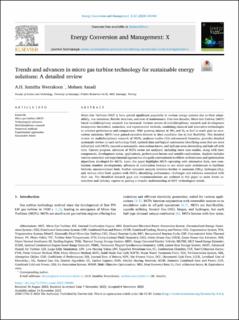| dc.description.abstract | Micro Gas Turbines (MGT’s) have gained significant popularity in various energy systems due to their adaptability, low emissions, flexible structure, and ease of maintenance. Past two decades, Micro Gas Turbine (MGT) based multidisciplinary research has increased. Various sectors of multidisciplinary research and development incorporate theoretical, numerical, and experimental methods, combining classical and innovative technologies to enhance performance and compactness. With growing interest in NH3 and H2 as fuel to reach goal on zero-carbon emissions, MGTs have gained excessive interest as ideal candidate due to fuel flexibility. This detailed review on multidisciplinary research of MGTs, analyzes twelve (12) sub-research branches, provides detailed systematic review on each technology field, updated data and logical conclusions identifying areas that are most influential with MGTs, towards a sustainable, zero-carbon future, and indicate areas descending and fade off with time. Current progress, advances of MGTs sector are analyzed, including latest case studies, along with their components, development status, applications, performance factors and notable explorations. Analysis includes various numerical and experimental approaches alongside conventional workflow architectures and optimization algorithms developed for MGTs. Later, the paper highlights MGTs operating with alternative fuels, new combustion chamber developments, advances in combustion kinetics to suit micro-scale architecture to facilitate biofuels, unconventional fuels. Further extensive analysis stretches further to ammonia (NH3), hydrogen (H2), and various other fuels applied with MGTs, identifying performance, challenges and solutions associated with their use. The identified research gaps and recommendations are outlined in this paper to assist future researchers and industry experts in gaining a broader understanding of MGT technological trends. | en_US |

